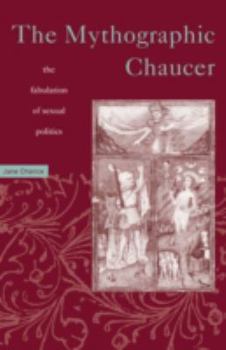Mythographic Chaucer: The Fabulation of Sexual Politics
Select Format
Select Condition 
Book Overview
Provides a many-sided look at the poems of Chaucer and the sexual politics of his day.
The concealment of embarrassing, often sexual, secrets and the burden of political alliances and strategies-in short, sexual politics-motivated Chaucer in much of his work. This concept, long suspected but mostly ignored by Chaucer critics, finally receives its first full treatment in The Mythographic Chaucer. Firmly placing Chaucer in the cultural politics of his time, Jane Chance shows how he inverted the mythographic and textual conventions of the period for his own literary, social, and political purposes.
Comparing significant mythological images, references, and figures in Chaucerian poems with those of other medieval mythographers, Chance discloses Chaucer's ironic use of mythographic tradition to disguise the scandalous and politically sensitive. Here we see, for instance, how Chaucer relied on the medieval model of poetic concealment to construct the fabulation (the narratio fabulosa, itself a medieval techne) of sexual politics. This analysis gives us a rich sense of the complexity of Chaucer's mythographic options and his playful employment of contextual material as he rewrote-and tried to resolve-tensions among vernacular, classical, and Christian (sometimes Hebraic) scriptural and textual traditions. Invaluable to an understanding of Chaucer, this book is also instructive in showing how mythographic analysis can combine "traditional" literary elucidation with the issues of contemporary cultural theory.Format:Paperback
Language:English
ISBN:0816622779
ISBN13:9780816622771
Release Date:January 1995
Publisher:University of Minnesota Press
Length:416 Pages
Weight:1.20 lbs.
Dimensions:0.8" x 5.9" x 9.0"
Customer Reviews
0 rating





